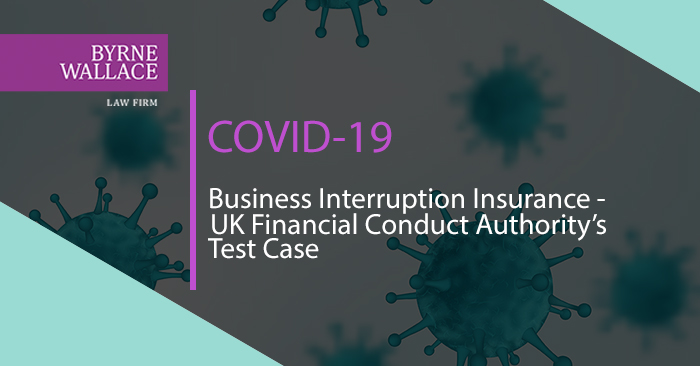Business Interruption Insurance - UK Financial Conduct Authority’s Test Case
Wednesday, 26 August 2020
Judgment is expected next month in the UK’s Financial Conduct Authority’s (“FCA”) novel test case regarding whether or not certain business interruption insurance policies provide coverage for businesses during COVID-19. This judgment will impact up to 370,000 policyholders in the UK.
We analyse below the procedural steps undertaken by the FCA to date as well as the issues to be determined in this judgment.
As recently examined in our article of 8 August, the Central Bank of Ireland ("Central Bank") has adopted a different approach to address the similar issues being faced by Irish businesses with business interruption insurance. The Central Bank published its Business Interruption Supervisory Framework on 5 August 2020.
Although this UK judgment will not be legally binding in Ireland, it is likely to provide strong persuasive guidance to Irish insurers who are currently defending or contemplating defending business interruption claims arising from COVID-19.
ByrneWallace is actively monitoring developments in Ireland and the UK and is available to discuss any business interruption issues that you or your business may have.
The FCA Test Case
Procedural Steps
Key procedural steps in the FCA test case:
- On 1 June 2020, the FCA published a preliminary list of affected insurers and business interruption policies. Out of the 16 insurers on the list, eight entities agreed to be defendants in the test case:
- Arch Insurance (UK) Ltd;
- Argenta Syndicate Management Ltd;
- Ecclesiastical Insurance Office Plc.;
- Hiscox Insurance Company Ltd;
- MS Amlin Underwriting Ltd;
- QBE UK Ltd;
- Royal & Sun Alliance Insurance Plc; and
- Zurich Insurance Plc.
- Whilst policyholders/stakeholders are not technically parties to the proceedings, they have been given multiple opportunities to engage with the FCA in relation to the scope of the action. For example, at the outset, the FCA engaged with policyholders on the proposed questions to be determined by the court, and at a later stage policyholders were invited to comment on the insurers' filed Defences helping to form the basis of the FCA’s Reply to Defence.
- The court permitted two action groups to intervene in the test case (Hospitality Insurance Group Action and the Hiscox Action Group), allowing each group to file written submissions and make brief oral submissions at a listed July hearing. The Hiscox Action Group comprises almost 400 policyholders, and being interveners in the FCA test case gives “policyholders a voice in the case”[1].
- Ahead of trial commencement, the parties published a set of Assumed Facts which contained factual scenarios which some parties used in the trial to illustrate their views regarding how coverage was triggered. A set of ten Agreed Facts was also published which were necessary to resolve the issues in dispute, these covered amongst other things, the chronology of the UK Government's COVID-19 response and the characteristics of the disease.
- The FCA and defendant insurers entered into a Framework Agreement on 31 May dealing with the mechanics of bringing the action. The Agreement states that if a losing party wishes to appeal the court's decision this shall be done on an expedited basis. If an appeal is sought, the FCA and the insurers have agreed to explore the possibility and appropriateness of seeking an appeal which would “leapfrog” to the Supreme Court[2] (i.e. not having to be heard by the Court of Appeal in the first instance).
Issues to be Determined by the Court
Whilst the FCA test case will have ground-breaking ramifications within the insurance industry, the action only applies to "relevant non-damage business interruption policies" (policies which cover business interruption from causes other than property damage: for example, policies relating to infectious/notifiable diseases, non-damage denial of access and public authority closures and restrictions).
In addition, although the UK judgment is likely to provide some resolution on key issues in respect of business interruption COVID-19 issues, it is important to note that separate issues may arise with policy wording which are not being considered in those proceedings. The FCA judgment may be influential in this context, but not necessarily conclusive.
The FCA test case seeks clarity from the court on two key questions:
- Coverage – do business interruption policies which have a non-damage insuring clause provide cover for business loss, arising as a result of interruption or interference, caused by the COVID-19 pandemic?
- Causation – if coverage can be established, can the policyholders establish the necessary causal link between the losses sustained and the relevant peril, event or circumstance that is covered?
To assist with answering these two key questions, the court is also being asked to determine[3]:
- Extent of business interference/interruption: What effect is required on the insured business to amount to business "interruption" or "interference".
- Disease Cover: Whether the term “notifiable disease/human infectious or human contagious disease” includes COVID-19, and guidance on the disease being within the “vicinity” of premises or within a certain radius. The Court is also being asked to consider the terms “manifestation” and/or “occurrence” of the disease.
- Denial of Access Cover: The level of proof required by the policyholder to show prevention/restriction of access or use of insured premises. Further guidance is also sought on whether the advice of the UK Government amounted to, amongst other things, “restrictions” in the context of business interruption policies.
- Exclusions: Whether various exclusions for loss present in business interruption policies may apply to the agreed and assumed facts.
For further information on the FCA test case, or on how we can assist businesses bringing COVID-19 business interruptionclaims, please contact Mark O’Shaughnessy, Partner, Tanya Cotterell, Solicitor or your usual contact in the ByrneWallace Litigation Team.
Please note that the content of this summary does not amount to professional advice. Legal and tax advice should be sought in respect of specific queries. The COVID-19 situation is evolving rapidly and this update is provided on the basis of information available as at 26 August 2020.

